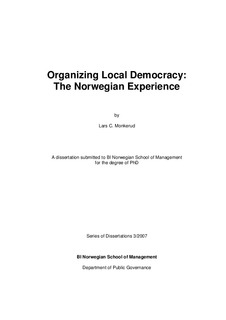Organizing Local Democracy: The Norwegian Experience
Abstract
The dissertation traces empirically certain prerequisites for effective local democratic politics as viewed in terms of the functioning of the local democratic chain of delegation and in terms of the functional organization of a local tier of government. Propositions from previous theoretical and empirical research is put to the test in statistical analyses using official data characterizing Norwegian municipal and county governments (1983-2003) and data collected in survey questionnaires going to Norwegian local council members (1995-2003).
One broad motivation for the dissertation viewed as a whole is that much previous research that has sought specifically to assess the quality of Norwegian (and Nordic) local democratic politics has downplayed issues of delegation and electoral control with the representative political level. Still, apart from being motivated by questions concerning the quality of Norwegian local democracy, the present dissertation also explores the operation of some very general mechanisms of democratic politics. One major methodological advantage of the present dissertation’s overall design is that it allows for the comparison of several hundred units embedded within the same national regulatory framework.
Taken together, the individual studies of the dissertation (chapters two through five) would seem to elicit the broad conclusion that Norwegian local democratic politics does show itself effective in some exceptional circumstances: voters may react sensibly to local policy and local parties may act as real disciplining organizations and they may take up positions as distinct local political alternatives. On the other hand, a general finding is also that there is vast potential for improvement, and that efforts in that direction would likely have to deal with issues to do with the strong national influence on Norwegian local politics.
Series
Series of Dissertations3/2007
